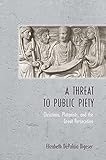A threat to public piety : Christians, Platonists, and the great persecution / Elizabeth DePalma Digeser.
Material type: TextPublication details: Ithaca : Cornell University Press, (c)2012.Description: 1 online resource (xv, 218 pages)Content type:
TextPublication details: Ithaca : Cornell University Press, (c)2012.Description: 1 online resource (xv, 218 pages)Content type: - text
- computer
- online resource
- 9780801463969
- BR1604 .T474 2012
- COPYRIGHT NOT covered - Click this link to request copyright permission: https://lib.ciu.edu/copyright-request-form
| Item type | Current library | Collection | Call number | URL | Status | Date due | Barcode | |
|---|---|---|---|---|---|---|---|---|
 Online Book (LOGIN USING YOUR MY CIU LOGIN AND PASSWORD)
Online Book (LOGIN USING YOUR MY CIU LOGIN AND PASSWORD)
|
G. Allen Fleece Library ONLINE | Non-fiction | BR1604.23 (Browse shelf(Opens below)) | Link to resource | Available | ocn784034502 |
Browsing G. Allen Fleece Library shelves, Shelving location: ONLINE, Collection: Non-fiction Close shelf browser (Hides shelf browser)
Includes bibliographies and index.
Introduction : from permeable circles to hardened boundaries -- Ammonius Saccas and the philosophy without conflicts -- Origen as a student of Ammonius -- Plotinus, Porphyry, and philosophy in the public realm -- Schism in the Ammonian community : Porphyry volume Iamblichus -- Schism in the Ammonian community : Porphyry volume Methodius of Olympus -- Conclusion : the Ammonian community and the great persecution.
In A Threat to Public Piety, Elizabeth DePalma Digeser reexamines the origins of the Great Persecution (AD 303-313), the last eruption of pagan violence against Christians before Constantine enforced the toleration of Christianity within the Empire. Challenging the widely accepted view that the persecution enacted by Emperor Diocletian was largely inevitable, she points out that in the forty years leading up to the Great Persecution Christians lived largely in peace with their fellow Roman citizens. Why, Digeser asks, did pagans and Christians, who had intermingled cordially and productively for decades, become so sharply divided by the turn of the century?Making use of evidence that has only recently been dated to this period, Digeser shows that a falling out between Neo-Platonist philosophers, specifically Iamblichus and Porphyry, lit the spark that fueled the Great Persecution. In the aftermath of this falling out, a group of influential pagan priests and philosophers began writing and speaking against Christians, urging them to forsake Jesus-worship and to rejoin traditional cults while Porphyry used his access to Diocletian to advocate persecution of Christians on the grounds that they were a source of impurity and impiety within the empire.The first book to explore in depth the intellectual social milieu of the late third century, A Threat to Public Piety revises our understanding of the period by revealing the extent to which Platonist philosophers (Ammonius, Plotinus, Porphyry, and Iamblichus) and Christian theologians (Origen, Eusebius) came from a common educational tradition, often studying and teaching side by side in heterogeneous groups.
COPYRIGHT NOT covered - Click this link to request copyright permission:
There are no comments on this title.







